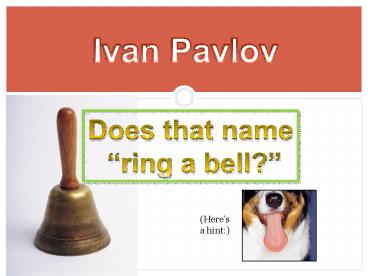Congratulations! - PowerPoint PPT Presentation
1 / 9
Title:
Congratulations!
Description:
(Here s a hint:) In 1904, Russian physiologist, psychologist, and physician Ivan Pavlov was awarded the Nobel Prize for discoveries about digestion. – PowerPoint PPT presentation
Number of Views:192
Avg rating:3.0/5.0
Title: Congratulations!
1
Ivan Pavlov
Does that name ring a bell?
(Heres a hint)
2
Ivan Petrovich Pavlov
Conditioned Reflexes The sound . . . is the
signal for food, and the animal reacts to the
signal in the same way as if it were food no
distinction can be observed between the effects
produced on the animal by the sounds ... and
showing it real food. I. P. Pavlov, 1927
- In 1904, Russian physiologist, psychologist, and
physician Ivan Pavlov was awarded the Nobel Prize
for discoveries about digestion. By then, he had
already begun exciting new research. He was
fifty-five years old. - For the next 30 years he studied conditioned
reflexes using dogs as subjects. His discoveries
made him world famous. - They made his dogs famous, too.
3
Ivan Pavlov, you just won the Nobel Prize. What
are you going to do for the next 30 years?
- Ring bells!
- Ring bells and feed dogs!
- Ring bells without feeding dogs!
- Observe dogs responses!
4
- Some of Pavlovs Famous
Dogs - Their names are written in the Cyrillic
alphabet and translated below.
Top row, from left Krasavietz, Beck, Milkah,
Ikar, Joy Bottom row, from left Tungus,
Arleekin, Rusian, Toi, Murashka
5
. . . the dog . . . man's best friend. Ivan
Pavlov
Pavlovs Chronic Experiment Technique Pavlov
realized that performing long-term experiments on
healthy, alert animals yielded better results
than acute experiments on anesthetized animals.
This required . . . good housing and
care. The American Physiological Society,
Press Release Putting Physiology into the
Nobel Prize 2004 Marks 100th Anniversaryof
Pavlovs Award.
- Legend has it that a caretaker in Pavlovs
St. Petersburg laboratory commented that she felt
the dogs used in experiments would be happier
if they were free to exercise in the open air in
the countryside. - As the story goes, this was the motivation for
Pavlov to move his research operation to Koltushi
a village outside the city. - Jackie Wood, The First Nobel Prize for
Integrated Systems Physiology Ivan Petrovich
Pavlov, 1904, Physiology, Vol. 19, No. 6,
326-330, December 2004.
6
Our healthy and happy animals did their
laboratory work with real gusto they always
eagerly moved from their cages to the laboratory
and readily jumped onto the tables where our
experiments and observations were conducted. .
. . through its intelligence and willingness the
dog contributes a great deal to the success of
the investigation. I. P. Pavlov
Pavlov and an assistant observe a dog. See the
dark spot on the dogs jaw? Pavlov pioneered a
painless operation to implant a device to collect
a dogs saliva externally. This allowed
scientists to accurately measure the dogs
salivation in response to stimuli such as food
and sounds.
7
Pavlovs Impact
Using Pavlovian conditioning techniques, doctors and veterinarians can desensitize human and animal patients to painful procedures and phobias. Scientists have applied Pavlovs ideas about learning to other animals, from insects to mollusks to mammals.
Pavlov's views on the humane treatment of lab animals influenced todays ethical standards for animal experiments. Pavlov was a physiologist first, but his ideas directly influenced the behaviorist theories in psychology.
8
A Scientist to the End
Observation, Observation Words carved over the
entrance to Pavlovs laboratory
- Pavlov was working at the laboratory within a
week of his death . . . and up until the last
half hour of his death he was recording
observations on his own behavior. - W. Horsley Gantt
Caricature licensed by The Pennsylvania State
University. Jeff Parker, Department of
Psychology, 2005.
9
Pavlovs Dog The Game!
- Can you train a dog to drool on command?
- Heres your chance to find out. Play Pavlovs
Dog, a free, interactive, online game on the
Nobel Prize website. Click on the image to play!































